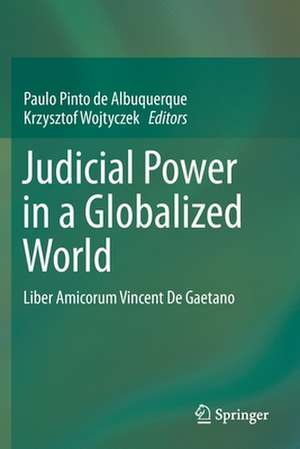Judicial Power in a Globalized World: Liber Amicorum Vincent De Gaetano
Editat de Paulo Pinto de Albuquerque, Krzysztof Wojtyczeken Limba Engleză Paperback – 25 aug 2020
| Toate formatele și edițiile | Preț | Express |
|---|---|---|
| Paperback (1) | 1126.84 lei 6-8 săpt. | |
| Springer International Publishing – 25 aug 2020 | 1126.84 lei 6-8 săpt. | |
| Hardback (1) | 1133.30 lei 6-8 săpt. | |
| Springer International Publishing – 24 aug 2019 | 1133.30 lei 6-8 săpt. |
Preț: 1126.84 lei
Preț vechi: 1374.19 lei
-18% Nou
Puncte Express: 1690
Preț estimativ în valută:
215.62€ • 225.73$ • 178.41£
215.62€ • 225.73$ • 178.41£
Carte tipărită la comandă
Livrare economică 05-19 aprilie
Preluare comenzi: 021 569.72.76
Specificații
ISBN-13: 9783030207465
ISBN-10: 3030207463
Pagini: 685
Ilustrații: XII, 685 p. 2 illus.
Dimensiuni: 155 x 235 mm
Greutate: 0.96 kg
Ediția:1st ed. 2019
Editura: Springer International Publishing
Colecția Springer
Locul publicării:Cham, Switzerland
ISBN-10: 3030207463
Pagini: 685
Ilustrații: XII, 685 p. 2 illus.
Dimensiuni: 155 x 235 mm
Greutate: 0.96 kg
Ediția:1st ed. 2019
Editura: Springer International Publishing
Colecția Springer
Locul publicării:Cham, Switzerland
Cuprins
The Independence of the Judiciary in Strasbourg Judicial Disciplinary Case Law: Judges as Applicants and National Judicial Councils as Factotums of Respondent States.- The selection of Judges and Advocate-General at the Court of Justice of the European Union: the role of the Panel established under art. 255 TFEU.- The fair trial as a guarantee of the administrative procedure.- Judicial independence: constitutional principle or human right?.- The role of the European associations and organisations of judges in promoting and safeguarding the judicial independence.- Independence of international courts.- Institutional nature of international courts and its impact on their competence.- Human Dignity as a normative concept. “Dialogue” between European Courts (ECtHR and CJEU)?.- The dialogue between the European Court of Human Rights and domestic authorities: between respect for subsidiarity and deference.- On Legitimacy for the Exercise of Public Power.- Judicial integrity and judicial independence: two sides of the same coin.- An International Mechanism of Accountability for Adjudicating Corporate Violations of Human Rights? Problems and Perspectives.- Legal basis for the establishment of international courts.- Judicial Review and Life Imprisonment.- Human rights due diligence in international law: where do we go from here?.- International Courts and Tribunals as Determiners of the Law on State Responsibility - Is a UN Convention on State Responsibility still necessary?.- In Search of the Optimal Court Administration Model for New Democracies.- How ‘liberal’ democracies attack(ed) judicial independence: an anecdote from De Gaulle’s France.- Powers conferred upon the EU and the powers of the Court of Justice: the protection afforded to same-sex couples in a stable relationship.- Internal Organisation of Regional Human Rights Courts: the European Court of Human Rights and the Inter-American Court of Human Rights.- The notion of judicial independence: impartiality and effectiveness of judges.- Disciplinary liability of a judge for a legal error: a threat to judicial independence?.- Institutional Communication as a Means to Strengthen the Legitimacy of Constitutional Courts.- Third parties involved in international litigation proceedings. What are the challenges for the ECHR?.- The judicial path to European constitutionalism: the role of the national judge in the multi-level dialogue.- Protecting the Independence of International Judges: Current Practice and Recommendations.- The General Court of the European Union – character, competences and reform.- European soft-law and organization of national judiciaries.- Individual Religious Liberty under Article 9 and Identity as Dignity.- The popular sovereignty and its constitutional limits: the European Court of Human Rights as the last resto for avoiding the banality of the evil.- Reflections on Contemporary Issues of Judicial Independence.- The subjective right of the judge to his own independence.- The United Nations’ Internal Justice system and fair trial rights of international staff members in disciplinary proceedings.- The Role of the Proportionality Test in the Workplace Surveillance Field.- International Arbitration in the Adjudication System of a State Party to the European Convention on Human Rights.- The Administrative Tribunal of the Council of Europe – some observations with regard to procedural and substantive guarantees.- Advisory opinions of the European Court of Human Rights – do national judges really need this new forum of dialogue?.- Judicial and Non-Judicial Elements In The Enforcement Mechanism Of The European Convention On Human Rights.- Transnational Law’s Legitimacy Challenge for International Courts.
Notă biografică
Paulo Pinto de Albuquerque, European Court of Human Rights, Strasbourg, France
Krzysztof Wojtyczek, European Court of Human Rights, Strasbourg, France
Textul de pe ultima copertă
This book explores fundamental topics concerning the functioning of the judiciary. The authors – class scholars, international judges and jurists from a diverse range of countries – address general theoretical issues in connection with judicial power, the role and functioning of international courts, international standards concerning the organization of national judiciaries, and the role of domestic courts in international relations, as well as alternative means of settling disputes. The book contributes a novel and valuable global perspective on burning issues, especially on judicial power and independence in a time in which illiberal and authoritarian regimes are constantly seeking to diminish the role of the judiciary.
Caracteristici
Provides a study of the main transformations in judicial power in today’s world Shares valuable insights into how international courts and judges actually work Written by a high-caliber team of contributors hailing from all over the world
